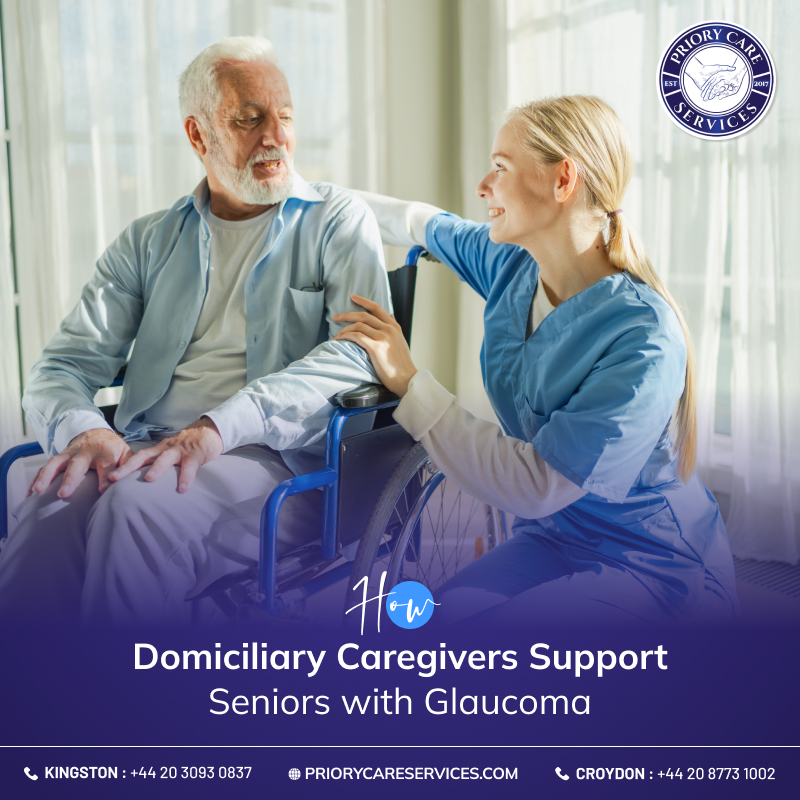Glaucoma often happens without any major indications. It’s also usually painless and slow-progressing, and if not treated at the righte, it can cause irreversible vision loss. Especially for seniors. Glaucoma is known to be one of the leading causes of blindness in people aged 60 and above.
When diagnosed with it, glaucoma can severely impact an elderly person’s quality of life and independence. However, with proper medication management, monitoring, and early intervention, the effects can be minimised. This is where domiciliary care agencies play a vital role. Read on to know in detail.
Understanding Glaucoma in Seniors
What Is Glaucoma?
Glaucoma is a collective disease of certain eye conditions that damage the optic nerve, usually due to high intraocular pressure. If left untreated for a long time, it results in peripheral vision loss and eventually central vision impairment.
Why Seniors Are at Higher Risk
As one grows old, the eye’s drainage system starts degrading, so it gets harder to maintain the normal intraocular pressure. Moreover, it progresses slowly and without noticeable symptoms. So individuals in whom glaucoma starts developing around their 40s or 50s may not notice the changes until their 60s or 70s. So, older adults are more at risk because of the following factors:
- Age-related degeneration
- Coexisting conditions like diabetes or hypertension
- Delayed diagnosis due to subtle early symptoms
- Challenges with medication management
Thus, in these cases, early detection is critical, yet maintaining eye health requires consistent care. And this is something many elderly family members struggle with all by themselves.
The Role of Domiciliary Care in Glaucoma Management
1. Medication Management
Seniors often deal with multiple medications, making adherence difficult. Domiciliary carers help administer glaucoma eye drops on schedule, monitor for side effects or reactions, and remind the patients to refill prescriptions and attend appointments. Proper medication intake is one of the most effective ways to prevent glaucoma-related vision loss, and carers take care of that.
2. Support with Eye Appointments
Mobility issues and cognitive decline can lead to missed eye exams. At-home caregivers schedule and accompany seniors to ophthalmologist visits. They also provide transportation and assistance navigating clinics and communicate with the patient’s doctor on their behalf. This ensures early signs of progression are not missed and treatments are adjusted as needed.
3. Environmental Modifications
As glaucoma progresses, vision becomes increasingly limited. Most professionals of domiciliary care in Croydon, Bromley, and Kingston Upon Thames make changes at home to suit needs. They request modifying lighting and making the home brighter after evening to reduce fall hazards in the home.
They might reorganise furniture and daily-use items for easy navigation and keep pathways clear for the elderly family member to walk freely. They can also suggest installing contrasting colours or tactile markers to support vision impairment. These adjustments help seniors maintain autonomy and safety in their environment.
4. Emotional and Psychological Support
Vision loss can lead to depression, anxiety, and social isolation. Domiciliary caregivers offer companionship and daily interaction, alongside encouragement to engage in hobbies and activities. They also keep monitoring for signs of mental health issues. The emotional support offered by at-home carers is just as important as clinical assistance.
5. Health Monitoring Beyond the Eyes
Glaucoma often coexists with other chronic illnesses. Regular, holistic health monitoring by domiciliary care staff ensures that the patient’s blood pressure and blood sugar levels stay under control. They consult with the patient’s doctor and family and make sure that medications for other conditions do not conflict with the eye treatments. The carers also ensure that nutrition and hydration remain optimal. This comprehensive approach reduces the risk of compounded health problems.
Also if you have been admitted to hospital and now discharged, know what you can gain from respite care services from our other blog, here.
Conclusion
Glaucoma doesn’t have to be a saddening disease. If you are already diagnosed with it, the right support system can help you manage the issue effectively and maintain a good quality of life. Domiciliary care agencies here become the bridge between clinical guidance and daily home care. The staff hired from these agencies ensure that the elderly family member lives with proper treatment, appointments, and lifestyle adjustments.
Domiciliary carers offer hands-on support, emotional care, and a safe living environment. While these reduce the risks of glaucoma-related vision loss, it also empowers the patients to live confidently and independently.
Looking to support a loved one with glaucoma? You can trust Priory Care Services with domiciliary care services as an ally in preserving their vision and dignity.




